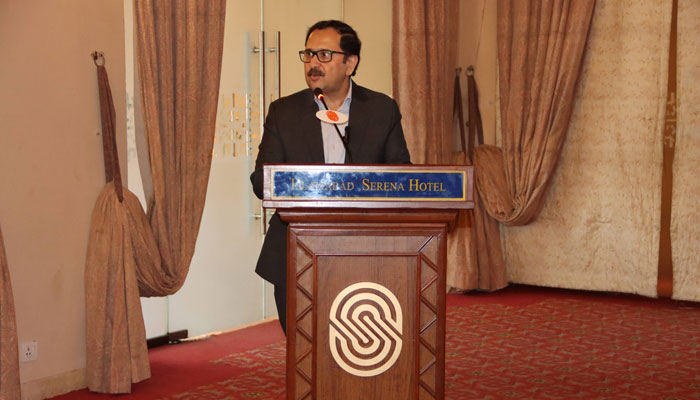Collaboration, innovation in enhancing climate resilience strategies stressed
Islamabad:National Disaster Risk Management Fund (NDRMF) chairman Bilal Anwar on Thursday emphasised the critical importance of collaboration and innovation in enhancing climate resilience and adaptation strategies.
“A coordinated and holistic approach towards climate change, resilience and Adaptation is the only viable way to understand and assess how adversely and profoundly climate change affects people, communities and economy. It is also essential to understand that it is an issue that affects everyone but disproportionately affect certain groups more than others. Hence, a nexus approach will allow to address these interconnected issues and challenges in an effective and holistic manner. This event provides a perfect opportunity to build coordination and partnerships for a better future for people of Pakistan,” Bilal Anwar told a function held by Action Against Hunger to launch several research studies aimed at addressing climate resilience and improving humanitarian response in Pakistan.
The event brought together a diverse group of experts, policymakers, humanitarians and community leaders to discuss how Pakistan can better adapt to and mitigate the effects of climate change. The key feature of the event was a panel discussion on “Cross-Sector Collaboration for Climate Resilience and Effective Humanitarian Response,” The panelists included Idrees Mahsud, member - Disaster Risk Reduction, National Disaster Management Authority (NDMA), Asif Sherazi, Country Director - Islamic Relief Pakistan, Farrah Naz, Country Director - Global Alliance for Improved Nutrition (GAIN), Ms. Humera Qasim Khan - Climate Change and Environmental Specialist and Nabeela Umar, secretary of climate change in Sindh.
Country Director of Action against Hunger Pakistan Mission Aamir Muhammad said the event would provide a critical opportunity to assess the impact of climate change on communities and highlight the urgent need for adaptive strategies. "Addressing the gaps in our current approaches and developing effective solutions is essential. Our goal is to empower communities with the necessary tools and knowledge to adapt and thrive amidst climate challenges.”
Additionally, the event included insightful presentation by experts on the Impacts of Climate Change on the Effectiveness of Integrated Humanitarian Assistance in Vulnerable Districts of Sindh and Balochistan. These presentations highlighted the challenges faced in delivering humanitarian aid effectively amid changing climate conditions and discussed the gaps and strategies for improvement. Participants engaged with experts, explored case studies, and contributed to a comprehensive road map for future action. In addition, the experts also highlighted the challenges faced by agriculture sector in Khyber-Pakhtunkhwa in the wake of climate change. They said the province had witnessed various disasters in the recent past and even in 2024 ongoing monsoon have damaged agriculture.
The experts reflected on long term solutions for adaptive agriculture strategies in KP. During the event, findings regarding malnutrition in Sindh especially for infants and mothers were highlighted and a few innovative practices to improve the maternal and newborn nutrition were shared with the participants. The organisers said the insights gained from the event would play a pivotal role in shaping policies and programs aimed at strengthening Pakistan’s resilience to climate change. They said through addressing gaps and leveraging innovative solutions, this collaborative effort sought to build a more adaptive and resilient future for the country.
-
 Caitlin O’Connor Says Fiance Joe Manganiello Has Changed Valentine’s Day For Her
Caitlin O’Connor Says Fiance Joe Manganiello Has Changed Valentine’s Day For Her -
 Rachel Zoe Sends Out Message For Womne With Her Post-divorce Diamond Ring
Rachel Zoe Sends Out Message For Womne With Her Post-divorce Diamond Ring -
 James Van Der Beek's Final Conversation With Director Roger Avary Laid Bare: 'We Cried'
James Van Der Beek's Final Conversation With Director Roger Avary Laid Bare: 'We Cried' -
 Jaden Smith Walks Out Of Interview After Kanye West Question At Film Premiere
Jaden Smith Walks Out Of Interview After Kanye West Question At Film Premiere -
 Why Halle Berry Wasn't Ready For Marriage After Van Hunt Popped Question? Source
Why Halle Berry Wasn't Ready For Marriage After Van Hunt Popped Question? Source -
 Michelle Obama Gets Candid About Spontaneous Decision At Piercings Tattoo
Michelle Obama Gets Candid About Spontaneous Decision At Piercings Tattoo -
 Bunnie Xo Shares Raw Confession After Year-long IVF Struggle
Bunnie Xo Shares Raw Confession After Year-long IVF Struggle -
 Brooks Nader Reveals Why She Quit Fillers After Years
Brooks Nader Reveals Why She Quit Fillers After Years -
 Travis Kelce Plays Key Role In Taylor Swift's 'Opalite' Remix
Travis Kelce Plays Key Role In Taylor Swift's 'Opalite' Remix -
 How Jennifer Aniston's 57th Birthday Went With Boyfriend Jim Curtis
How Jennifer Aniston's 57th Birthday Went With Boyfriend Jim Curtis -
 JoJo Siwa Shares Inspiring Words With Young Changemakers
JoJo Siwa Shares Inspiring Words With Young Changemakers -
 James Van Der Beek Loved Ones Breaks Silence After Fundraiser Hits $2.2M
James Van Der Beek Loved Ones Breaks Silence After Fundraiser Hits $2.2M -
 Disney’s $336m 'Snow White' Remake Ends With $170m Box Office Loss: Report
Disney’s $336m 'Snow White' Remake Ends With $170m Box Office Loss: Report -
 Travis Kelce's Mom Donna Kelce Breaks Silence On His Retirement Plans
Travis Kelce's Mom Donna Kelce Breaks Silence On His Retirement Plans -
 Premiere Date Of 'Spider-Noir' Featuring Nicolas Cage Announced
Premiere Date Of 'Spider-Noir' Featuring Nicolas Cage Announced -
 Pedro Pascal's Sister Reveals His Reaction To Her 'The Beauty' Role
Pedro Pascal's Sister Reveals His Reaction To Her 'The Beauty' Role




